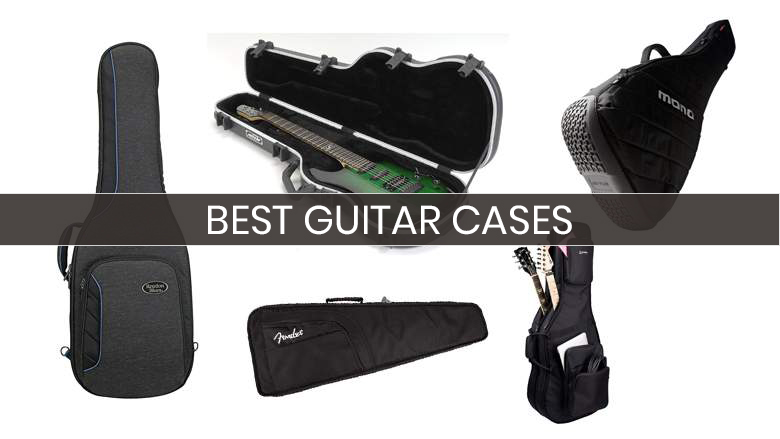
The vessel in which you carry your guitar could mean the difference between enjoying your guitar until it becomes a vintage collectable and having to run to Guitar Center to pick up some random new axe because the neck snapped off of yours. (Or the headstock — looking at you, Les Paul lovers.) I’m a proponent of having two cases. You’ll want one soft case for safer, usually local, transportation, just for convenience. Places you frequent that you know you can trust, in vehicles you know you can trust. Of course, anything can happen at any time, and the best protection comes from hardshell cases, so having one of those is a good idea, too. If you ever fly with your guitar, a hardshell case is absolutely required.
Protect your precious electric guitar with one of our picks for the best guitar cases and gig bags.
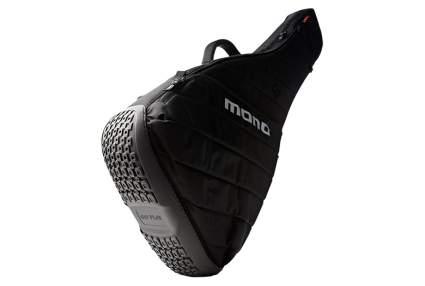
|
Amazon Customer Reviews
|
Price: $269.99 Shop at Amazon | Shop now Read our review |
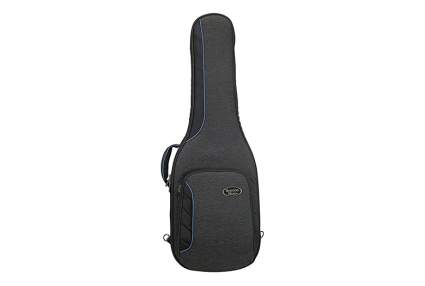
|
Amazon Customer Reviews
|
Price: $241.97 Shop at Amazon | Shop now Read our review |
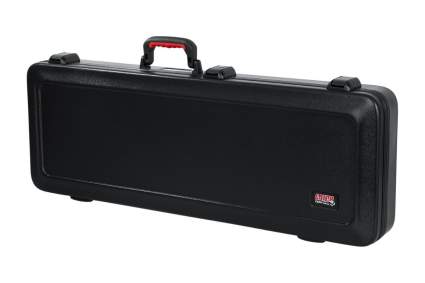
|
Amazon Customer Reviews
|
Price: $199.99 Shop at Amazon | Shop now Read our review |
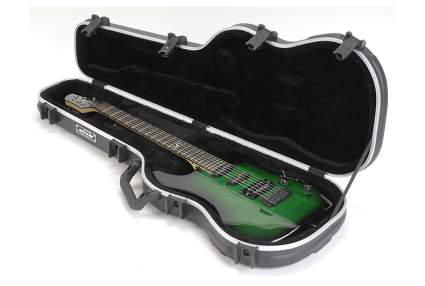
|
Amazon Customer Reviews
|
Price: $214.99 Shop at Amazon | Shop now Read our review |
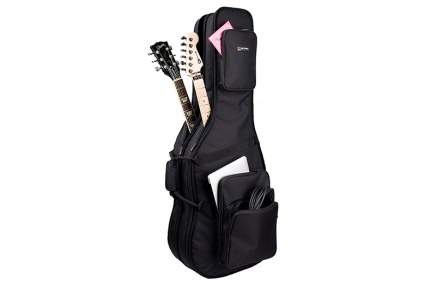
|
Amazon Customer Reviews
|
Price: $105.75 Shop at Amazon | Shop now Read our review |
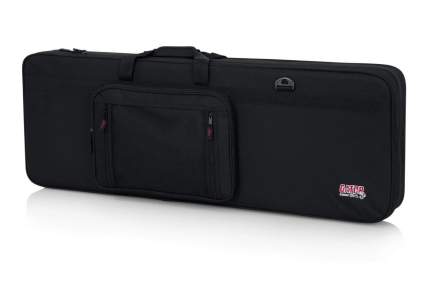
|
Amazon Customer Reviews
|
Price: $129.99 Shop at Amazon | Shop now Read our review |
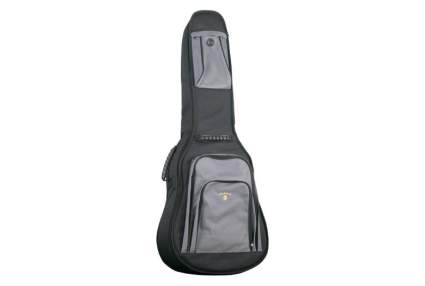
|
Amazon Customer Reviews
|
Price: $40.90 Shop at Amazon | Shop now Read our review |
-
1. Mono M80 Vertigo Electric Guitar Case
Pros:- Excellent protection without being hard shell
- Headlock neck support system
- Water and damage resistant
Cons:- Doesn't lock as securely as TSA-style options
- Expensive
- Somewhat overly large
If the Guardian doesn’t provide enough protection but you still don’t want a hardshell case, this offering from Mono should fit the bill. Admittedly, it’s pretty pricey for being a soft style case, but this offers a number of improvements that might make it worth the cost for you. The outer covering is made of Sharkskin, which is an advanced outdoor sports material made to resist damage and water. Between that layer and the inner liner are panels of ABS plastic to protect against impacts, while a large rubber outsole provides significant protection on the bottom.
For those of you with fragile headstocks, this case also has a device called a Headlock, which is a molded neck support system that maintains the distance between the case and the headstock to prevent breaking. Finally, the case hinges in the front so you can open it from the top while standing. Comes in this electric guitar size, as well as semi-hollow, bass, and dreadnaught styles.
Again, it’s a significant spend, but it’s also probably the best protection you can get in anything outside of a hardshell case. The company also makes the M80 Sleeve for $100 less with a lower level of protection.
Why you would choose this one: Offers the best possible protection for any case without a hard exterior.
Specs:
- Material: Sharkskin, rubber, ABS plastic
- Number of pockets: Three
- Carrying style: Fabric handle and backpack straps
- Total length: 41.5 inches
- Body section length: 21 inches
- Lower bout: 14.5 inches
- Upper bout: 11.5 inches
- Depth: 3 inches
Find more Mono M80 Vertigo Electric Guitar Case information and reviews here.
-
2. Reunion Blues RBCE1 RB Continental Voyager Electric Guitar Case
Pros:- Cheaper alternative to the Mono
- Internal impact panels provide enhanced protection
- Internal neck brace and optional backpack straps
Cons:- Still quite pricey
- Doesn't lock
- Not ideal for flying
As an alternative to the Mono, you might consider this Reunion Blues model that sports many similar features. The internal neck brace is present, though this one uses a strip of fabric to hold it in place. This case offers one inch thick padding, except at the bottom, where there’s additional, adjustable padding to protect against drops. There are backpack straps as with the options above, but these can be hidden behind a zippered compartment when not in use.
The whole case is water resistant, while the top and bottom are covered in a knurled abrasion grid to resist wear. Like the Mono, there are internal impact panels to move this a touch closer to a hardshell option. Still pricey, but one of the most popular options for professional-level protection. This one is available in electric, bass, semi-hollow, dreadnought, and small body acoustic sizes.
Why you would choose this one: The Mono case is a bit too expensive for you, but you still want many of the same innovations in a soft case.
Specs:
- Material: Ballistic Quadraweave™
- Number of pockets: Two
- Carrying style: Fabric handle and backpack straps
- Total length: 40 inches
- Body section length: Unknown
- Lower bout: 14 inches
- Upper bout: 13 inches
- Depth: 3 inches
-
3. Gator Cases GTSA Series Electric Guitar Cases
Pros:- Durable handle and TSA-approved trigger locks
- Rectangular shape can be easier to load
- Good variation of guitar types
Cons:- Open internal storage can make a mess
- Not being custom shaped helps with fit, but detracts a little from security
- Some find the exterior prone to scratching
A small upgrade to the SKB is this similarly TSA-approved offering from Gator. While the SKB shapes the exterior of the case to the instrument a bit, some find that a rectangular case is better for loading purposes. This way, the case doesn’t sit at an angle when put on its side. The latches on this are the same as the SKB, using the locking center trigger latch. The handle is a bit nicer on this one, though the storage is open, as opposed to the under-neck compartment of the SKB. Choose between the standard electric shape for Strat and Tele styles, as well as Les Paul, SG, Dreadnought, Semi-Hollow, and Classical versions.
They also offer the Deluxe case, which is cheaper, using the old-style latches and a regular plastic handle.
Why you would choose this one: You like the SKB, but want something just a bit better in rectangular form.
Specs:
- Material: Polyethylene, rubber, polyester, aluminum
- Number of pockets: Two
- Carrying style: Rubber handle
- Total length: 39.5 inches
- Body section length: 19.25 inches
- Lower bout: 12.5 inches
- Upper bout: 12.5 inches
- Depth: 3.25 inches
Find more Gator Cases GTSA Series Electric Guitar Cases information and reviews here.
-
4. SKB Shaped Electric Hardshell
Pros:- TSA-approved trigger release latches
- Molded EPS foam conforms to body
- Contoured shape saves space
Cons:- Somewhat pricey
- May be overkill for simple trips to lessons
- Molded foam interior can cause trouble for irregular body shapes
Naturally, the best protection comes from hardshell cases. The molded plastic exteriors are waterproof and generally far more capable of dealing with a variety of road traumas. This SKB option is pretty close to the model I use as my flight case. This is the newer version, which uses TSA-approved trigger release locking latches. These are heavy duty latches that will make your flight check-ins easier without sacrificing security.
The interior of this case is molded with EPS foam to fit the style of guitar pretty closely — this one (FS-6) is meant for Strats, while the SKB-56 works for Les Pauls and the SKB-63 fits Explorers and Firebirds. The neck support runs from the molded body compartment to the headstock, keeping your guitar safely in place. Additional carrying capability is limited to one interior compartment and there are no shoulder straps, but when you compare the price to the Mono and the Reunion Blues, that could be a trade-off worth making.
Why you would choose this one: You need a hardshell case with the basic accommodations.
Specs:
- Material: Plastic, nylon, EPS foam, polyester, aluminum
- Number of pockets: One
- Carrying style: Rubber handle
- Total length: 39.25 inches
- Body section length: 16.5 inches
- Lower bout: 12.75 inches
- Upper bout: 11.25 inches
- Depth: 2.75 inches
Find more SKB Shaped Electric Hardshell information and reviews here.
-
5. Pro Tec CF234DBL Double Electric Guitar Gig Bag
Pros:- Holds two guitars comfortably
- Thick separation padding
- Handy pockets and backpack straps
Cons:- Not ideal for long-distance travel
- Doesn't lock
- Won't fit your hollowbodies
If you’re headed to a gig, there’s a very good chance you’re bringing two guitars along with you. Even if you’re like me and you’ve never broken a string, it’s just kind of a silly gamble to take. (As an aside, the backup guitar to my Strat was usually a mid-2000s Gibson Les Paul Standard. To be fair, it wasn’t mine, which is why I didn’t use it all the time.) If you’re going to be toting two guitars, they might as well go in the same case, if possible.
My band mate used one of these for years with great success. The 25 mm padding provided excellent protection both from the outside world and from the guitars smashing together. Like the Guardian, there are rubber feet to keep it in place when leaning against something. Having them both in the same case saved room in the car and made them far easier to carry. It does get awfully heavy, but that usually didn’t deter us. I also really liked the various exterior and interior pockets.
Why you would choose this one: You want your main guitar and your backup to travel together.
Specs:
- Material: Nylon
- Number of pockets: Five
- Carrying style: Fabric handle and backpack straps
- Total length: 43 inches
- Body section length: 19.5 inches
- Lower bout: 17.5 inches
- Upper bout: 14 inches
- Depth: 2.5 inches
Find more Pro Tec CF234DBL Double Electric Guitar Gig Bag information and reviews here.
-
6. Gator Electric Guitar Lightweight Polyfoam Case
Pros:- Super lightweight yet better protection than a gig bag
- Full-length neck support
- Optional shoulder strap
Cons:- Not good enough for flying
- Somewhat pricey for what it is
- Not as waterproof as you may need
Taking the same general shape as the hardshell above, this Gator variant combines the protection of rigid cases with the light weight of soft cases. I had one of these for years before moving on to the Guardian and it served nobly. The inside of these aren’t as tightly molded as some of the others, so this is more likely to fit your guitar unless you have a large hollowbody.
Just the same, they make versions for Les Paul, SG, and bass players, in addition to this one for Strats and Teles. The neck is still supported for almost the whole length, though being made of nylon, it won’t keep water out to the same degree.
Why you would choose this one: You don’t need the hard exterior, but you still want a rigid frame.
Specs:
- Material: Nylon, EPS foam, polyester
- Number of pockets: Two
- Carrying style: Fabric handle and shoulder strap
- Total length: 39.5 inches
- Body section length: 19 inches
- Lower bout: 12.75 inches
- Upper bout: 12.75 inches
- Depth: 3.38 inches
Find more Gator Electric Guitar Lightweight Polyfoam Case information and reviews here.
-
7. Guardian CG-220-E 220 Series DuraGuard Bag
Pros:- Inexpensive
- Durable handles
- Backpack straps
Cons:- Certainly not the choice for long-distance travel
- Angled headstocks beware
- When using Schaller-type strap locks, a hole can eventually wear through the bottom
This is the case I use when I’m not flying. I got my 1985 MIJ Fender Strat nearly ten years ago and this case has done most of the heavy lifting during that time. I bought it for the backpack straps, which have really come in handy when I’m also carrying my amp and pedalboard down the inevitably narrow stairway at the local watering hole. The inside is lined and offers 20 mm of padding, as well as a neck strap.
There are rubber feet for security when resting against your amp. The handles are extra tough and comfortable for long hauls, making this an excellent upgrade to the standard gig bag. I have personally carried my Strat, a Schecter Omen-6, and a Les Paul in it over the years, but your larger hollowbody guitars are unlikely to fit.
Why you would choose this one: Cheap, decent protection for many years worth of local gigs.
Specs:
- Material: Nylon
- Number of pockets: Three
- Carrying style: Rubber handles and backpack straps
- Total length: 40.5 inches
- Body section length: 20 inches
- Lower bout: 14 inches
- Upper bout: 12 inches
- Depth: 2.5 inches
Find more Guardian CG-220-E 220 Series DuraGuard Bag information and reviews here.
Buying a guitar case is one of the few instances where it matters very much that you know what kind of guitar you have. To speak extremely generally, in the land of electric guitars, there are basically four categories when it comes to shapes of electric guitars:
Stratocaster/Telecaster: While these are technically different body shapes, for the purposes of guitar case buying, they tend to overlap. Unless you're using a specifically molded case, the same types of cases will work for Strat and Tele type guitars. This includes all the Super Strat variants made by Charvel, Ibanez, Jackson, Yamaha, and so forth. Usually, SG style guitars will fit in these cases, too.
Les Paul: Shorter necks, thicker bodies, and angled headstocks mean that LP-style guitars generally require special cases. Gig bags are sometimes flexible enough to accommodate them, but for the most part, you'll be looking to buy something made specifically for LPs.
Offset: This is a broader, less uniform category characterized by guitars with asymmetrical tops and bottoms. This includes Fender types like Jazzmasters and Jaguars, Gibson types like Firebirds, Explorers, and Flying Vs. BC Rich guitars also generally fit here. You'll either be looking for something molded specifically for these or with a large enough space to accommodate them.
Semi- and hollowbody: This covers a very wide range of instruments from Epiphone styles like Sheraton, Dot, and Casino as well as Grestch Electromatic and more. These are often very large and require cases made especially for them, though again, a large enough gig bag could do the job.
Not everything fits into one of these, but most guitars do. In fact, most guitars are either Strat style or Les Paul style, since these are the most enduring and sought-after designs. Guitars from makers like Reverend, Eastwood, Godin, Ernie Ball, G&L, Dean, and Schecter are typically descended from the Strat and thus fit in Strat-style cases. ESP (and LTD), Gretsch (solid body), and PRS are usually loosely descended from Les Paul-style guitars. These are very broad generalizations, of course. You'll want to measure your actual guitar, but this provides at starting point for deciding what case to buy.
That said, if nothing on the market will work for you, you can always go custom-made. While most players will find what they need in the other items on this list, hardcore traveling musicians require hardcore cases. Hoffee makes custom-fitted carbon fiber cases meant to be abused, even by the TSA and luggage handlers. They’re about as water resistant as it gets, using a tight-fitting seal.
In addition to having it custom-fit to your guitar, you can choose from your choice of exterior colors (gray, red, blue, green, purple, and white) and interior colors (black, green, red, blue, and gold). You can also purchase add-ons like straps, Thinsulate insulation, and different latching mechanisms. Sure, the price is extreme, but so is the protection.
See also:
Best Cool Guitar Picks
Best Cool Guitar Straps
Best Guitar Stands